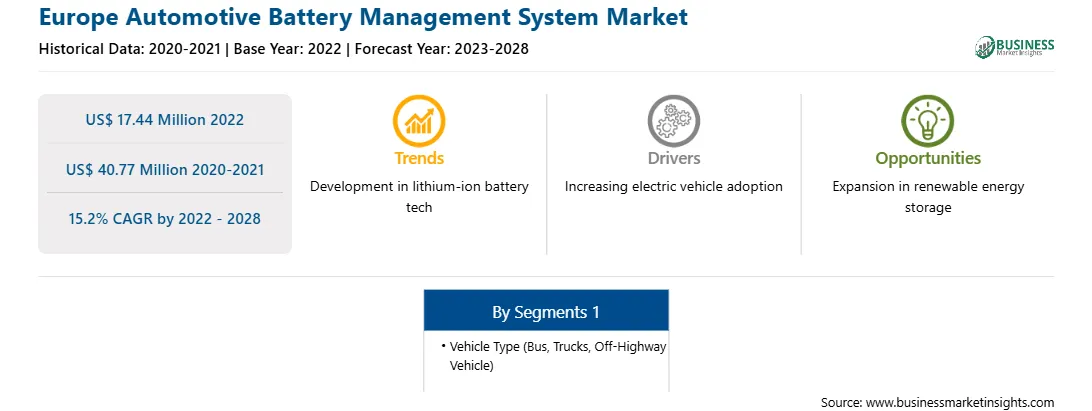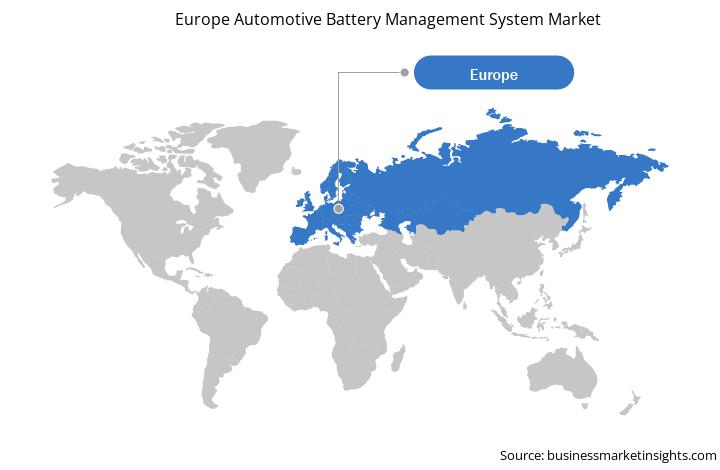Governments of European Union countries are proactively taking steps to increase the adoption of EVs, especially cars, buses, and trucks. The Zero Emission Vehicle Infrastructure Program (ZEVIP) is a US$ 680 million initiative that will be active till 2027. As per the European Environment Agency, electric car registrations in 2020 were close to 1,325,000 units, up from 550,000 units in 2019. Furthermore, the recently proposed legislation by the European Commission sets targets to mitigate carbon emissions of cars by 55% and vans by 50% by 2030. It also proposes to completely cut emissions from cars and vans by 2035.Also, fuel economy standards were revised for trucks in the country in 2020, as the country is expected to reduce 80% of its automotive greenhouse gas emissions by 2050 through its automotive strategy. Such favorable initiatives and policies are anticipated to boost the adoption of EVs, such as cars, trucks, and vans, thereby driving the adoption of batteries and battery management systems. Thus, various government initiatives and policies favoring low-emission vehicles is fueling the Europe automotive battery management system market.
Germany, France, Spain, the UK, and the Czech Republic are leading countries in Europe that produce the maximum number of motor vehicles and electric passenger cars. The automotive industry plays a significant role in the growth of Europe’s prosperity, as it accounts for a significant portion in the region’s GDP. As per the IEA data, electric car sales in Europe, continued to increase in 2021 by more than 65% year-on-year to 2.3 million, after the boom of 2020. EV sales remained strong even though the overall automotive market has not yet fully recovered from the pandemic. Therefore, the presence of a robust automotive industry in Europe boosts the demand for automotive battery management systems due to large-scale vehicle production. European Commission and national regulatory bodies take numerous initiatives to support the development of the automotive industry in the region. For instance, CARS 2020 Action Plan, GEAR 2030, and Horizon 2020 are a few major European government initiatives that augment the vehicle production. The Horizon 2020 Plan focuses on providing funds for research & development (R&D) activities in the industry by launching programs such as the European Green Vehicles Initiative for smart mobility, road transport, and logistics. Also, in July 2021, the European Commission proposed a revision of Regulation (EU) 2019/631 to reduce carbon emissions by cars and vans to achieve the EU's 2030 and 2050 climate objectives. The supportive government policies for mitigating carbon emissions increase the adoption of EVs. Such regulatory support from the European government propels the demand for battery management systems, which bolsters the Europe automotive battery management system market growth.
Strategic insights for the Europe Automotive Battery Management System provides data-driven analysis of the industry landscape, including current trends, key players, and regional nuances. These insights offer actionable recommendations, enabling readers to differentiate themselves from competitors by identifying untapped segments or developing unique value propositions. Leveraging data analytics, these insights help industry players anticipate the market shifts, whether investors, manufacturers, or other stakeholders. A future-oriented perspective is essential, helping stakeholders anticipate market shifts and position themselves for long-term success in this dynamic region. Ultimately, effective strategic insights empower readers to make informed decisions that drive profitability and achieve their business objectives within the market.

| Report Attribute | Details |
|---|---|
| Market size in 2022 | US$ 17.44 Million |
| Market Size by 2028 | US$ 40.77 Million |
| Global CAGR (2022 - 2028) | 15.2% |
| Historical Data | 2020-2021 |
| Forecast period | 2023-2028 |
| Segments Covered |
By Vehicle Type
|
| Regions and Countries Covered | Europe
|
| Market leaders and key company profiles |
The geographic scope of the Europe Automotive Battery Management System refers to the specific areas in which a business operates and competes. Understanding local distinctions, such as diverse consumer preferences (e.g., demand for specific plug types or battery backup durations), varying economic conditions, and regulatory environments, is crucial for tailoring strategies to specific markets. Businesses can expand their reach by identifying underserved areas or adapting their offerings to meet local demands. A clear market focus allows for more effective resource allocation, targeted marketing campaigns, and better positioning against local competitors, ultimately driving growth in those targeted areas.

The Europe automotive battery management system market is segmented into by vehicle type and country.
Continental AG; Dana Limited; GENTHERM; Hanon Systems; Mahle GmbH; Marelli Holdings Co., Ltd; NXP Semiconductors; Renesas Electronics Corporation; Robert Bosch GmbH and Valeo are the leading companies operating in the Europe automotive battery management system market.
The Europe Automotive Battery Management System Market is valued at US$ 17.44 Million in 2022, it is projected to reach US$ 40.77 Million by 2028.
As per our report Europe Automotive Battery Management System Market, the market size is valued at US$ 17.44 Million in 2022, projecting it to reach US$ 40.77 Million by 2028. This translates to a CAGR of approximately 15.2% during the forecast period.
The Europe Automotive Battery Management System Market report typically cover these key segments-
The historic period, base year, and forecast period can vary slightly depending on the specific market research report. However, for the Europe Automotive Battery Management System Market report:
The Europe Automotive Battery Management System Market is populated by several key players, each contributing to its growth and innovation. Some of the major players include:
The Europe Automotive Battery Management System Market report is valuable for diverse stakeholders, including:
Essentially, anyone involved in or considering involvement in the Europe Automotive Battery Management System Market value chain can benefit from the information contained in a comprehensive market report.